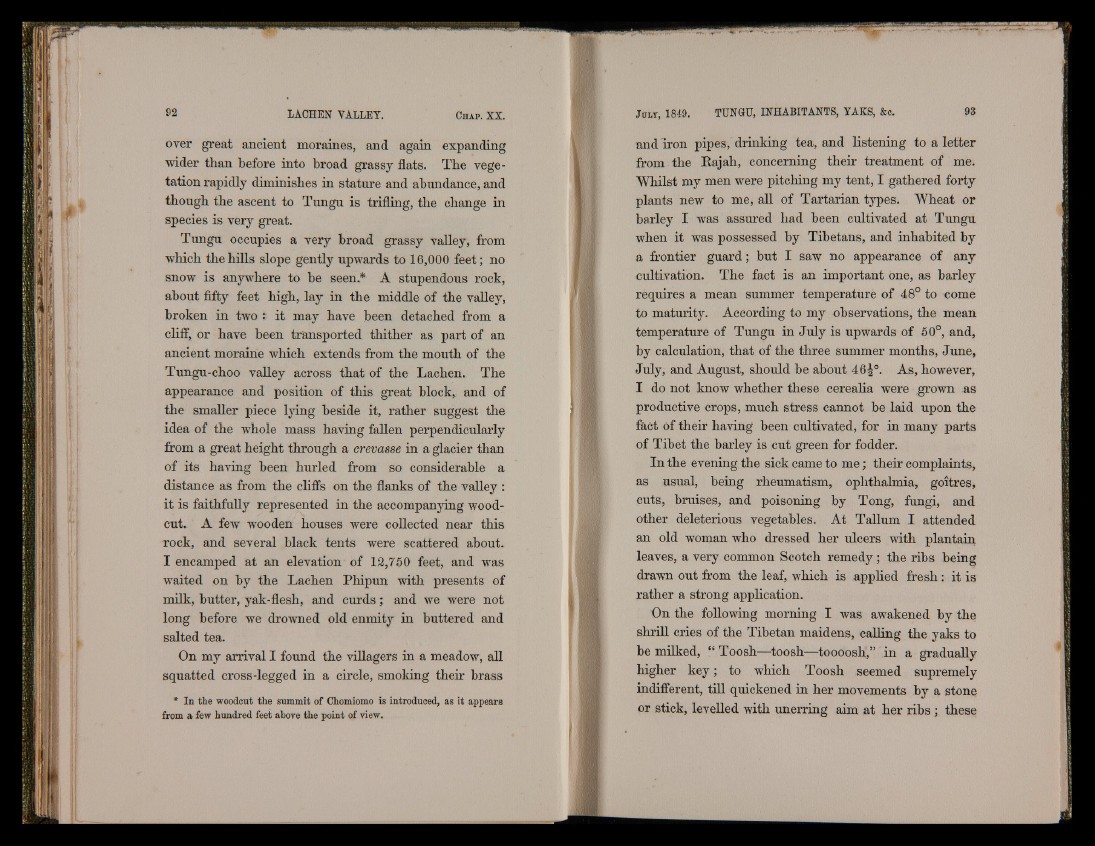
over great ancient moraines, and again expanding
wider than before into broad grassy flats. The vegetation
rapidly diminishes in stature and abundance, and
though the ascent to Tungu is trifling, the change in
species is very great.
Tungu occupies a very broad grassy valley, from
which the hills slope gently upwards to 16,000 feet; no
snow is anywhere to he seen.* A stupendous rock,
about fifty feet high, lay in the middle of the valley,
broken in two : it may have been detached from a
cliff, or have been transported thither as part of an
ancient moraine which extends from the mouth of the
Tungu-choo valley across that of the Lachen. The
appearance and position of this great block, and of
the smaller piece lying beside it, rather suggest the
idea of the whole mass having fallen perpendicularly
from a great height through a crevasse in a glacier than
of its having been hurled from so considerable a
distance as from the cliffs on the flanks of the valley :
it is faithfully represented in the accompanying wood-
cut. A few wooden houses were collected near this
rock, and several black tents were scattered about.
I encamped at an elevation of 12,750 feet, and was
waited on by the Lachen Phipun with presents of
milk, butter, yak-flesh, and cu rd s; and we were not
long before we drowned old enmity in buttered and
salted tea.
On my arrival I found the villagers in a meadow, all
squatted cross-legged in a circle, smoking their brass
* In the woodcut the summit of Chomiomo is introduced, as it appears
from a few hundred feet above the point of view.
and iron pipes, drinking tea, and listening to a letter
from the Eajah, concerning their treatment of me.
Whilst my men were pitching my tent, I gathered forty
plants new to me, all of Tartarian types. Wheat or
barley I was assured had been cultivated at Tungu
when it was possessed by Tibetans, and inhabited by
a frontier guard; but I saw no appearance of any
cultivation. The fact is an important one, as barley
requires a mean summer temperature of 48° to come
to maturity. According to my observations, the mean
temperature of Tungu in July is upwards of 50°, and,
by calculation, that of the three summer months, June,
July, and August, should be about 46|°. As, however,
I do not know whether these cerealia were grown as
productive crops, much stress cannot be laid upon the
fkct of their having been cultivated, for in many parts
of Tibet the barley is cut green for fodder.
In the evening the sick came to m e ; their complaints,
as usual, being rheumatism, ophthalmia, goitres,
cuts, bruises, and poisoning by Tong, fungi, and
other deleterious vegetables. At Tallum I attended
an old woman who dressed her ulcers with plantain
leaves, a very common Scotch remedy; the ribs being
drawn out from the leaf, which is applied fre sh : it is
rather a strong application.
On the following morning I was awakened by the
shrill cries of the Tibetan maidens, calling the yaks to
be milked, “ Toosh—toosh—toooosh,” in a gradually
higher k e y ; to which Toosh seemed supremely
indifferent, till quickened in her movements by a stone
or stick, levelled with unerring aim at her ribs ; these